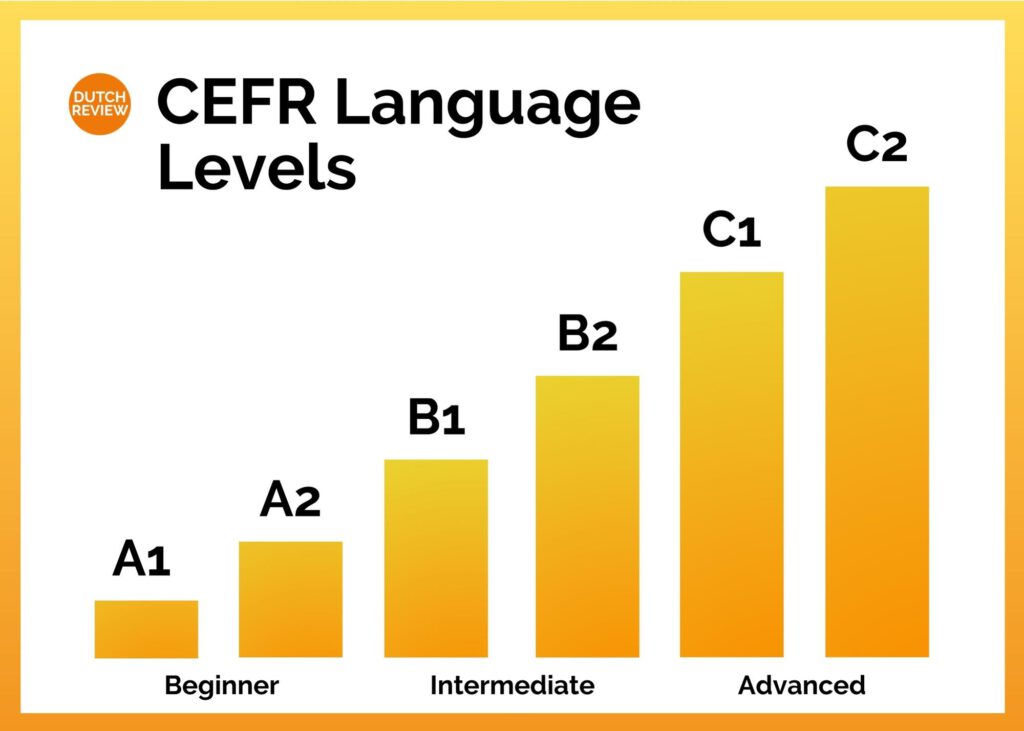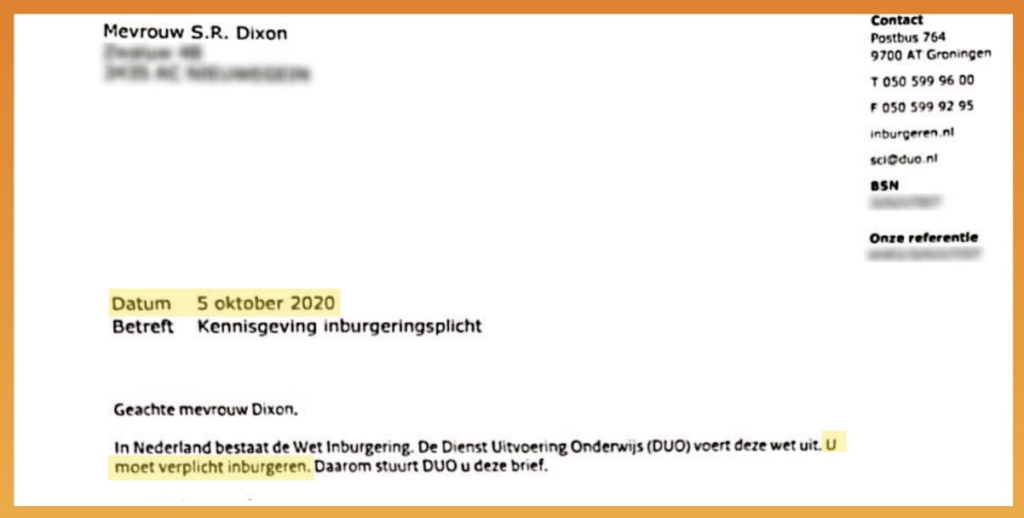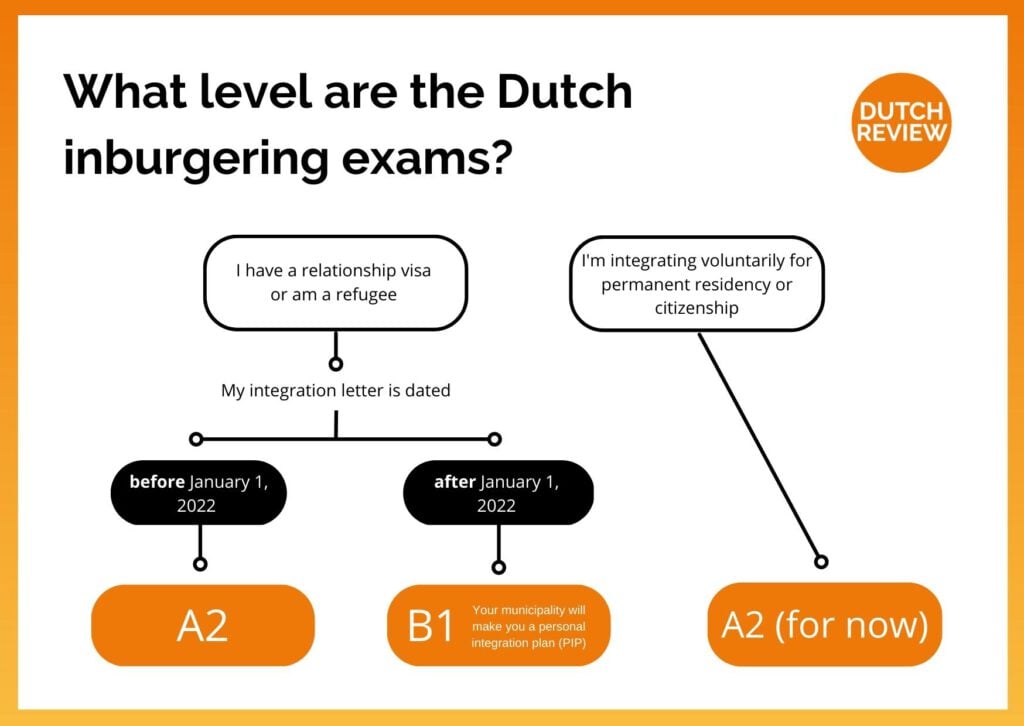You know you need to take the Dutch integration exam — but is the level A2? B1? Something else completely? It’s normal to be confused, but here’s the easy guide.
For the longest time, the Dutch integration exam was pretty straightforward: everyone did it at A2 unless they wanted to take a Dutch university course. Simple, right?
However, the Dutch government decided that A2 wasn’t enough to, well, integrate. To change the level, they had to change the whole integration law, which took a long time.
Now, if you’re wondering what language level the Dutch integration exam is, the answer is: it depends!
Some people are under the old system, some people are under a new system, and others are still undecided.
Here’s the easy guide to knowing at which language level you might need to take the Dutch integration exams in 2025.
We teamed up with the pros for this article: InburgeringOnline! Bart and his team have guided thousands of internationals through the Dutch integration process with affordable online courses designed to take you from zero Dutch to A2 or B1 in a flash. Find out more.
But first…
A2, B1? Are we speaking in code? If you’re feeling a little confused, we’re using terms from the Common European Framework of Reference for Languages (CEFR). It looks a little like this:

At what language level do I need to take the Dutch inburgering exams?
The language level of your Dutch integration exams has two main factors:
- Your visa or residency type and,
- The date the IND formally decided you must begin to integrate
I have a partner/relationship visa, or I am a refugee
If you have a partner or relationship visa or are a refugee, the IND will automatically decide that you must integrate. This typically happens shortly after the date that you registered at your local municipality.
You will receive a letter advising that you are required to integrate, or as DUO, the Dutch education authority, will write, “U moet verplicht inburgeren.”

The most important thing here is the date of the letter. That’s because there are two laws at play: The Civil Integration Act 2013, and the Civil Integration Act 2021 (which affects people from 2022 onwards).
You can tell which law you fall under by your letter’s date.
Your letter is dated before January 1, 2022
If the date of the letter is before January 1, 2022, then congratulations: the language level you will take the Dutch integration exams at is A2.
Your letter is dated after January 1, 2022
If the date of your letter is after January 1, 2022, you’ll need to study for a while longer: your language level will most likely be B1.
Why “most likely”? Technically, the municipality can decide for you to follow one of three routes:
- The B1 route: where you learn Dutch to a B1 level, mostly for integration and working or volunteering.
- The education route: where you learn Dutch to a B1 level or higher to prepare for higher education.
- The self-reliance route: an exemption given for people who must integrate but find the first two routes are too difficult. Instead, you learn Dutch to an A1 level and have non-mandatory exams.
However, the first route is supposed to be the most common option. The upside? You’ll speak pretty decent Dutch by the end!
To create your plan, you’ll first be invited for an initial meeting at your municipality: the brede intake or “broad intake.” Here, you’ll answer questions about your integration so far in the Netherlands, your education, your home life, and so on.
You will also take a basic exam called the leerbaarheidstoets, or “learning ability test.” This test requires no preparation or practice; it’s simply a test of understanding and comprehension.
After the initial meeting, your municipality will create a personal integration and participation plan (PIP). This plan details the steps of your integration process and the route that you will take.
What if the exams are too difficult? A municipality can make some rare exceptions to the language levels stated above — but typically only if you have health problems or would truly struggle to learn Dutch due to circumstances beyond your control.
I am integrating to apply for permanent residency or citizenship
If you don’t fall into the category of having a relationship visa or being a refugee, you likely:
- Are here on a temporary visa (such as a working visa),
- Have lived here for around five years, and
- Have decided to make your stay in the Netherlands more permanent.
We get it, the Netherlands is a leuk place to live!
If this is you, and you’re not an EU, EEA, Swiss, or Turkish citizen, then you’re integrating “voluntarily”, and it’s good news: the language level you will need to integrate is still A2 — for now.
While learning Dutch might seem like a long journey, an online course can let you do it on your own terms and in your own time. In fact, those using InburgeringOnline reported an online course was quicker, cheaper, and way more effective than traditional schools! Take a peek at the courses. 👀
While the Dutch government wants to raise the level to B1 for people in your position, they haven’t made a final decision on when to do so.
That means that if you can fully integrate and pass your exams to apply for permanent residency or citizenship before they decide to raise it, you shouldn’t have to study further than A2 level — based on the information the government has given so far.

TIP: Still not sure at which level you need to take your exams? Check out DUO’s inburgeren plan generator.
Do I need to take the Dutch integration exams?
Whether you need to take the Dutch integration exams is mostly determined by your nationality. If you’re not from an EU or EEA country, Switzerland, or Turkey, and you’re coming to live in the Netherlands long-term, you’ll likely need to take the Dutch integration exams.
As with anything, there are a few exceptions.
Whether you’re A2 or B1, we can tell you this: taking the Dutch integration exams is really achievable and worth it — especially if it leads to permanent residency or a Dutch passport!
At what language level do you need to take your Dutch integration exams? Share it in the comments below!
Dutch integration exam language level: Frequently asked questions
How long do I have to complete the inburgering exams?
If you are required to integrate in the Netherlands, you have three years to earn your Dutch integration certificate. Most people can study and take all the exams within a year, or even a few months.
Who has to take the integration exam in the Netherlands?
Anyone seeking to stay in the Netherlands for a longer period and who is not a member of an EU/EEA state, Turkey, or Switzerland must take the Dutch integration exams.
What language level is the Dutch integration exam in 2025?
The language level of the Dutch integration exam depends on your visa and when you became required to integrate.
For those on a relationship or refugee visa who became required to integrate before January 1, 2022, the level is A2, for those after that date, it is B1.
For people who are voluntarily integrating the language level is currently A2 but may rise to B1 in the future.
Is the Dutch integration exam level still A2?
The Dutch integration exam level is still A2 for people who became required to integrate before January 1, 2022 and (so far) for people who are voluntarily integrating in 2025. For everyone else, the level is likely to be B1.
How difficult is the Dutch integration exam?
The Dutch integration exam is taken at either A2 (basic) or B1 (intermediate) level, depending on your personal situation and when you became required to integrate. It’s possible to prepare for and pass the Dutch A2 integration exams within a few months. The preparation time for the B1 integration exam can take between six and 12 months, depending on your learning speed.

Hi! IELTS/Cambridge exam is valid 2 years – Any idea if the integration exam also have a life span? 😅 Meaning: if I take it in 2023, but I apply for naturalization in 2024 and the process of it finalizes in 2025… is it still valid or the exam’s passing date needs to be the same as the naturalization application date?
It doesn’t expire, do t worry. You pass it once and it will be valid forever.
Not true. The inburgering exams are valid for one year.
I start my integration schooling after 1 January 2022 .
I start on August 2022.
It’s that i also needed to do the B1 or A2?
Do you if it’s sufficient just to start one exam for example reading this year and continue next year on A2 or I have to complete all the exams before end of year?
Heilige koe! (Holy cow!) I’m a buitenlander van Hollandse ouders but I never heard of this language exam. The article left me wanting more info about the different levels. My Dutch was thuis geleert and I always wonder if I am any good at it. I’d like to try these exams just to see if I can pass any level at all. Can anyone advise where to get practice exams?
So what if you are an EU citizen that wants to voluntarily take the exam to acquire the citizenship? What level will it be for the exam?
I’m 74 years old w/ permanent Dutch residency. For naturalization, do I still need to take/pass the Inburgering exam? What level? (received my residency in May, ’20. I have a Dutch wife.`) Thanks!
Hi Martin, perhaps you can contact the IND to get answers about your personal situation. This is their phone number: 088 043 04 30 (standard rates apply).From abroad +31 88 043 04 30. Hope that helps! 🙂
I came to the Netherlands in February 2020. I am planning to finish A2 integration exam by 2023 (passed 3 exams, 2 are pending) When I apply for PR in February 2025, will A2 level diploma be acceptable?
Hey Jk, this all depends on whether you became obliged to integrate in 2020 or if you’re doing it voluntarily. We recommend checking in with DUO to find out your personal requirements if you’re not sure which category you fall in. 🙂
Hey jk, did you find an answer to this?
Hey jk, did you find an answer to this?
Please let us know!!
Thanks Ellen. I called IND. Learned that no language exemption for those 65+.
This article is super helpful thank you :))))
However I have one key question, in my situation I’m not required to integrate, I’m in the Netherlands with a self-employee residency permit (temporary) since 2020. I still have 2 more years to complete my 5-year and be able to apply for a Dutch passport. Question is that can I take the integration exam in 2023 or 2024 and get the certificates and wait until 2025?
IND has confirmed that the language level will remain at A2 through 2023.
Would you please suggest me knm A2 level , I’m self taught person, your help will be appreciated due to my exam will be in next three months
I work at a pre-school site. Refugees often volunteer with us. They generally have language level B1. Sometimes they like the work so much that they want to study to become pedagogical assistants. Not easy with level B1. But they can get extra language support and also learn things during their internship. But then: at a preschool with a VE programme (specially aimed at toddlers who would otherwise start primary education with a language deficiency), it is expected that you have level F3 as a staff member; you have to have passed an exam. And that’s where it gets stuck, which is a shame because new colleagues are badly needed!
I came to the Netherlands in 2023. I am preparing and planning to appear for an exam this year 2024. I am voluntarily appearing for an exam. I am eligible to apply for the RP in 2028.
1. Do I need to appear for the exam again?. if the level is increasing?
2. How long the validity of the exam will be.
Can you please provide your answers?
Thanks
What is the update as of on 08-NOV-2024 , any further clarity For people who are voluntarily integrating
Hey Ajay, we make sure to keep these articles updated with the latest information. What you are reading now, is the most up to date information regarding the inburgering. 🙂